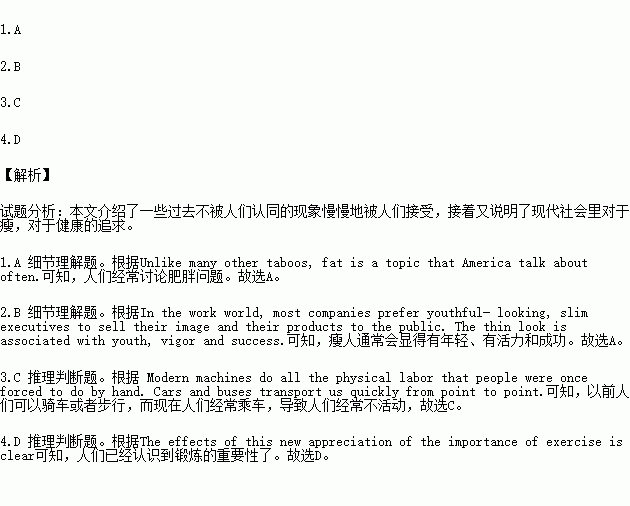ÌâÄ¿ÄÚÈÝ
One of the newest taboos (½û¼É) in American society is the topic of fat. Unlike many other taboos, fat is a topic that America talk about often. It is not taboo to talk about fat; it¡¯s taboo to be fat.
The ¡°in¡± look is thin. In the work world, most companies prefer youthful- looking, slim executives to sell their image and their products to the public. The thin look is associated with youth, vigor and success. The fat person, on the other hand, is thought of as lazy and lacking in energy, self-discipline and self-respect. After all, people think, how can people who care about themselves, and therefore the way they look, allow themselves to become fat? In an image conscious society like the U.S. , fat is ¡°out¡±.
It is not surprising, then, that millions of Americans have become obsessed (×ÅÃÔ)with staying slim and ¡°in shape¡±. The pursuit of youthful physical appearance is not, however, the only reason for America¡¯s obsession with diet and exercise.
Recent research has shown the great importance of diet and exercise for personal health. As in most technologically developed nations, the life-style of North Americans has changed very quickly during the course of last century. Modern machines do all the physical labor that people were once forced to do by hand. Cars and buses transport us quickly from point to point. As the result of inactivity and disuse, people¡¯s bodies can easily become weak and vulnerable to disease. In an effort to avoid such a fate, millions of Americans are spending more of their time exercising.
The effects of this new appreciation of the importance of exercise is clear: parks are filled with joggers and bicyclists, physical education programs are enjoying a newly- founded fame and many companies are providing exercise equipment for their employees to use during the work day.
1.In the United States, fat is something ___________.
A. people always talk about
B. not regarded as a taboo topic
C. people usually pay no attention to
D. belonging to the same treatment as other taboos
2.What do Americans think of thin people?
A. Their work helps them to look youthful
B. They are energetic and successful.
C. Their appearances affects their behavior
D. They are lacking in self-discipline.
3.According to Paragraph 4, which of the following is an example of ¡°inactivity?
A. Mary does her housework by hand.
B. Celia takes part in a marathon
C. Cecilia goes to her office by car.
D. Margaret plays badminton every Saturday.
4.Why are parks filled with joggers and bicyclists?
A. Because these parks are fit for sports.
B. Because people are enjoying prestigious status in parks.
C. Because people are taking part in physical education programs.
D. Because people now recognize they should do more exercise.

